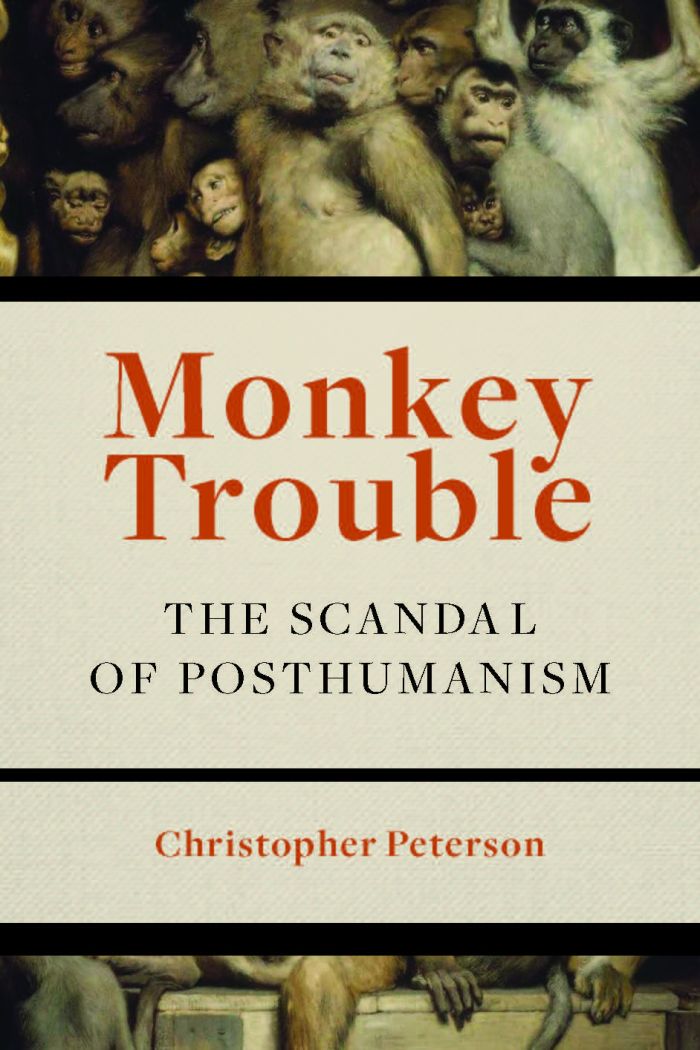Monkey Trouble
The Scandal of Posthumanism

This book can be opened with

According to scholars of the nonhuman turn, the scandal of theory lies in its failure to decenter the human. The real scandal, however, is that we keep trying.
The human has become a conspicuous blind spot for many theorists seeking to extend hospitality to animals, plants, and even insentient things. The displacement of the human is essential and urgent, yet given the humanist presumption that animals lack a number of allegedly unique human capacities, such as language, reason, and awareness of mortality, we ought to remain cautious about laying claim to any power to eradicate anthropocentrism altogether. Such a power risks becoming yet another self-accredited capacity thanks to which the human reaffirms its sovereignty through its supposed erasure.
Monkey Trouble argues that the turn toward immanence in contemporary posthumanism promotes a cosmocracy that absolves one from engaging in those discriminatory decisions that condition hospitality as such. Engaging with recent theoretical developments in speculative realism and object-oriented ontology, as well as ape and parrot language studies, the book offers close readings of literary works by J.M. Coetzee, Charles Chesnutt, and Walt Whitman and films by Alfonso Cuarón and Lars von Trier.
Anthropocentrism, Peterson argues, cannot be displaced through a logic of reversal that elevates immanence above transcendence, horizontality over verticality. This decentering must cultivate instead a human/nonhuman relationality that affirms the immanent transcendency spawned by our phantasmatic humanness.
Posthumanists, new materialists, neovitalists, cosmopoliticians, accelerationists, xenofeminists, post-poststructuralists, and speculative realists will have much to argue with here. But this is an argument they—we—would be well advised to have at this historical moment—a decade or two into the broader 'nonhuman turn'—given the often baroque claims, naïve enthusiasms, and extravagant contradictions performed in its name. In Peterson's meticulous and elliptical critique we encounter a forceful Counter-Reformation against the more heretical proclamations of posthumanism; along with a nuanced insistence that—when all is said and done—we are human, all too human, after all.—Dominic Pettman, The New School for Social Research
Peterson is a meticulous scholar with a philosophical and psychoanalytic background as deep as it is broad, with close reading that is never more rigorous and acute than when engaging with the intricate philosophies of Husserl and Derrida. It is a book that will, or at least should, cause serious anxiety among a great many philosophers and theorists of the so-called ‘nonhuman turn’, particularly those who have nailed their colors, perhaps precipitately, to the mast of object-oriented ontology.—Richard Iveson, The Year's Work in Critical and Cultural Theory
Peterson offers a refreshing perspective on those academic discourses whose critical target is human exceptionalism and anthropocentrism.—Vicki Kirby, University of New South Wales
Christopher Peterson’s Monkey Trouble: The Scandal of Posthumanism is a profound meditation on the problem of how we should orient ourselves to the Earth in our current geohistorical moment. In Monkey Trouble, Peterson develops a fascinating and highly original account of how humans are intrinsically earthbound.—Chris Danta, University of New South Wales
If certain strains of posthumanist discourse have become the law–regulative ideals in certain strains of theoretical discourse–then Christopher Peterson has no issue in breaking it. And these are laws I am relieved someone has broken. To my mind, Monkey Trouble offers the most cogent and withering critique of those branches of posthumanism associated with object-oriented ontology (OOO) and Speculative Realism (SR) in print. . . Of the critique Peterson has made [of speculative realism and OOO], I do not believe much can be said about it apart from its success; philosophy is certainly not known for decisive takedowns, but this is as close as anything I have read.—Chris Fleming, Western Sydney University
Introduction
(1) The Scandal of the Human: Immanent Transcendency and the Question of Animal Language
(2) Sovereign Silence: The Desire for Answering Speech
(3) The Gravity of Melancholia: A Critique of Speculative Realism
(4) Listing Toward Cosmocracy: The Limits of Hospitality
Notes
Bibliography
Index
Please click the link below to download the Open Access version of this book.
- Monkey Trouble - epub

